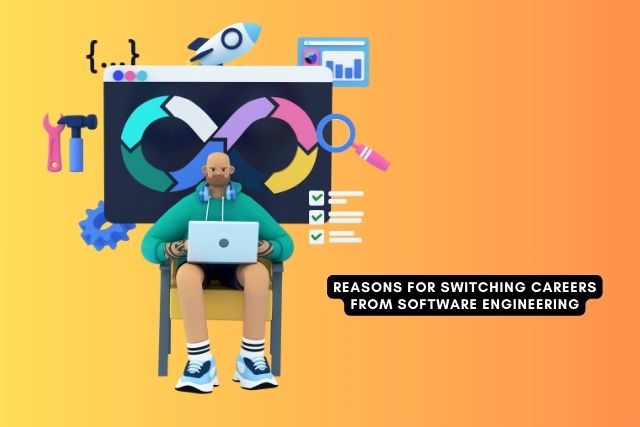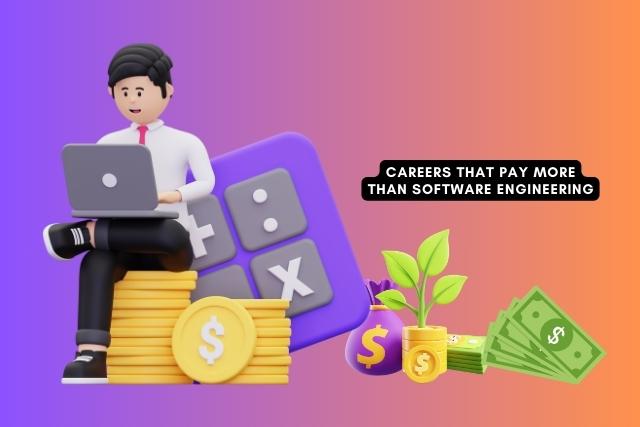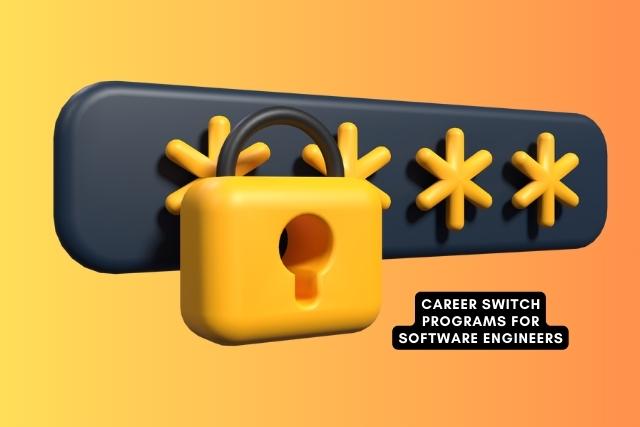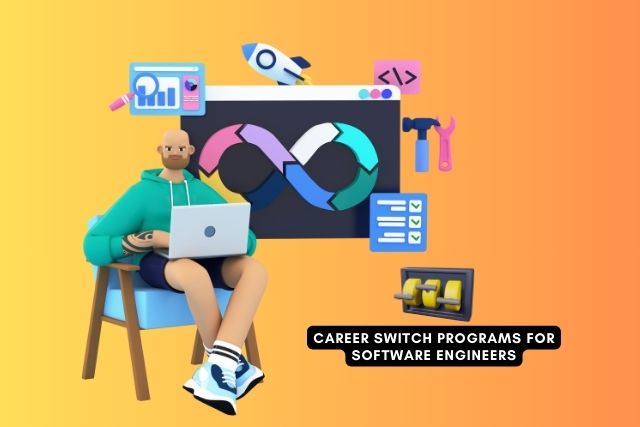Switching careers from Software Engineering means changing to a new career field, either within the tech industry or another industry. People change careers for many reasons starting from a lack of passion or interest, burnout, career advancement, etc.
However, switching careers from Software Engineering has many benefits. You can find a career you love, gain new skills and knowledge, and advance your career. Suppose you are considering switching careers from software engineering. In that case, it is essential to research and carefully plan your transition.
How to Switch Careers from Software Engineering
Your Software Engineering background is already a solid foundation for a successful transition into a different field. However, switching careers is a gradual process that must be done diligently.
Here are 7 ways to switch careers from software engineering:
1. Self-assessment
Transitioning to a new career often begins with knowing what you want. Reflect on why you want to make this change. Determine your core motivations, interests, and long-term goals. Understanding these will help you stay focused and committed during the transition. Additionally, acknowledge the skills you have as a software engineer. These transferable skills are valuable assets that can set you apart.
2. Research your target career
Immerse yourself in the field you want to go for. Dive into research to understand the nuances of your chosen industry. Examine job roles, career progression, and the specific skills required. Explore industry trends, salary expectations, and growth prospects. You can achieve this by reaching out to professionals already working in your desired field. Conduct informational interviews or attend industry events to learn about their experiences and gather valuable advice. It will help you tailor your transition plan effectively.
3. Skill development
Create a strategic learning plan once you’ve known the skills and qualifications for your new career. Enroll in courses and workshops or obtain certifications relevant to your chosen field. Online learning platforms offer various courses to help you acquire new skills. Leverage your software engineering background by identifying transferrable skills. For example, your analytical and data-driven mindset are assets if you’re transitioning into marketing.
4. Build a portfolio
Your portfolio should be a showcase of your abilities. Create projects, engage in freelance work or volunteer for relevant causes to demonstrate your newfound skills. Highlight how your software engineering background has equipped you with skills for your new field. An impressive portfolio is instrumental in convincing potential employers or clients of your capabilities and commitment to your new career.
5. Networking
Networking is valuable in career transitions. Connect with professionals in your target industry through networking events, social media platforms, and specialized forums or associations. Build relationships and engage in conversations related to your new field. Go for tech conferences and seek mentors for guidance. A mentor can offer insights, help you navigate challenges, and introduce you to valuable connections.
6. Gain experience
Practical experience is invaluable when changing careers. Look for internships, part-time positions, freelance opportunities, or volunteer roles in your chosen field. This hands-on experience will enhance your skillset and bolster your resume. Volunteering for projects or organizations in your new career path will provide networking opportunities and demonstrate your commitment to the field.
7. Update your resume
Tailor your resume to emphasize your relevant skills and experiences in the context of your new career. Highlight projects, achievements, and certifications that demonstrate your capability and dedication. Use action-oriented language to describe your accomplishments.
Best Careers to Switch to From Software Engineering
Switching from software engineering to another career opens up various opportunities. Your best choice will depend on your interests, skills, and goals.
Here are the 7 best careers to switch to from software engineering:
1. Data Science
Data scientists collect, analyze, and interpret data to extract valuable insights and inform business decisions. They work with statistical models and machine learning algorithms. Entry-level earn about $60,000 – $100,000, and middle-level earn $150,000, and expert-level earns more. To get into the career, acquire a strong foundation in mathematics, statistics, and programming (Python and R are relevant).
You need a bachelor’s or master’s degree in a relevant field like computer science, data science, or statistics. Additionally, you can gain practical experience through internships, projects, or Kaggle competitions. Then, build a portfolio showcasing your data analysis and machine learning projects.
2. Product Management
Product managers are responsible for defining, developing, and managing a product or service. They collaborate with cross-functional teams to ensure products meet customer needs. They earn about $70,000 for entry-level, $110,000 for middle-level, and $150,000 for expert-level.
For this career, develop strong communication and leadership skills. Learn about product development processes and methodologies (e.g., Agile, Scrum). Additionally, gain domain knowledge in the industry you want to work in. Consider earning a product management certification. Start as an associate product manager or take on related roles in software development.
3. Cybersecurity
Cybersecurity professionals protect computer systems and networks from security threats and breaches. They implement security measures, monitor for vulnerabilities, and respond to incidents. Entry-level earns about $70,000, middle-level earns $100,000, and expert-level makes about $150,000+
Before entering cybersecurity, develop expertise in cybersecurity technologies and tools. You can also pursue certifications like CompTIA Security+, Certified Information Systems Security Professional (CISSP), or Certified Ethical Hacker (CEH). Build a strong understanding of network security, encryption, and risk management. Consider starting with a cybersecurity internship or entry-level role.
4. UX/UI Design
User experience (UX) and user interface (UI) designers create visually appealing and user-friendly interfaces for websites and applications. They focus on enhancing the overall user experience.
This career pays about $60,000 for entry-level, middle-level is $90,000, while expert-level pays $130,000+. UX/UI design needs design skills and a strong portfolio of work.
Also, learn UX/UI design principles, tools (e.g., Adobe XD, Sketch), and user research techniques. You can also consider a formal design education or boot camp. Furthermore, start with internships, freelance projects, or junior design roles to gain experience.
5. Machine Learning Engineer
Machine learning engineers design and implement machine learning models and systems. They work on developing AI-driven solutions and optimizing algorithms. This career pays $70,000 for entry-level, $120,000 for middle-level, and an expert-level earns $160,000.
Individuals in this career must build a strong foundation in machine learning and deep learning concepts. You must be proficient in programming languages like Python and libraries like TensorFlow and PyTorch.
Furthermore, you can complete relevant online courses or earn a master’s degree in machine learning or a related field. In addition, develop a portfolio of machine learning projects and participate in competitions like Kaggle.
6. Management Consulting
Management consultants help organizations solve complex problems, improve efficiency, and make strategic decisions. They work with clients across various industries. For this career, people earn as much as $70,000 for entry-level, $120,000 for middle-level, and $200,000+ for professional level.
To switch to this career, you must develop problem-solving and analytical skills. Also, you can pursue a bachelor’s degree in a relevant field such as business, engineering, or economics. Furthermore, gain experience through internships or entry-level roles in consulting firms and consider earning an MBA for career advancement.
7. Digital Marketing
Digital marketers create and execute online marketing strategies to promote products or services. They work in SEO, social media, email marketing, and pay-per-click advertising. This career pays $45,000 for entry-level, $75,000 for middle-level, and $120,000+ for expert-level.
Individuals interested in this career must learn digital marketing techniques and tools through online courses. Additionally, you need to gain practical experience by managing personal or small business campaigns. You can also obtain digital marketing certifications and build a portfolio showcasing successful campaigns.
Reasons for Switching Careers from Software Engineering

There are various reasons why someone might consider switching careers from Software Engineering. These reasons are below.
Here are 7 reasons to switch careers from software engineering:
1. Burnout
Due to factors like long work hours, stringent project deadlines, and the ongoing need to keep up with changing technology, burnout is a common problem in the software engineering industry. The cumulative effect of these demands may result in fatigue and burnout.
As a result, many software engineers think about switching careers to achieve a better work-life balance and lower stress levels. Prioritizing their emotional and physical wellbeing provides a strong cause to explore alternative work possibilities.
2. Desire for a new challenge
Throughout their careers, software engineers deal with recurring problems and tasks. This pattern could eventually cause you to feel uninspired and long for fresh, challenging endeavours.
The motivation behind changing careers is the desire for a new challenge. It provides the chance to learn new skills, tackle challenging problems, and start a journey toward personal and professional development. The desire to study and innovate might be rekindled by choosing a fresh work path.
3. Interest in a different field
Software developers might become curious about completely different businesses or fields as their careers expand, such as healthcare, finance, or the arts. Their changing interests may have a significant impact on their future job goals. People can apply their skills and knowledge to causes they care about by switching to a field that resonates with them.
4. Lack of fulfillment
Although working in Software Engineering is often financially rewarding, some professionals may feel their work needs a more profound sense of fulfilment or purpose. They needed help understanding the relevance and overall impact of their work.
A profound sense of contentment can be attained by looking for a career move consistent with one’s values and objectives. Working in a field that directly benefits people, the environment, or other important causes is satisfying.
5. Career growth
Software engineers occasionally feel they need more prospects to advance in their organization or sector. They can want to take on more demanding roles, make more money, or get more notoriety.
Better opportunities for professional advancement are occasionally available by changing careers. Regarding job titles and earning potential, new industries can provide a broader range of chances for leadership and advancement.
6. Health reasons
Working in Software Engineering often involves sitting in front of a computer for extended periods. It can eventually result in many health problems, including eye strain, musculoskeletal problems, or a lack of physical activity.
People who worry about their health may want to think about less physically demanding or sedentary occupations. This change can improve general wellbeing and reduce health issues at work.
7. Job market trends
Due to the constant need for specialized knowledge and tools, Software Engineering is constantly evolving. Engineers may think about changing their career path if they notice a decline in the demand for their current area of expertise or a change in market trends.
By changing careers, one can increase job security and create new opportunities while adjusting to the changing dynamics of the labour market. A strategic reaction to shifting employment environments is to investigate industries with a growing need for their knowledge and abilities.
Careers That Use Software Engineering Skills
Software Engineering skills are highly versatile and transferable, opening up numerous career opportunities across various industries. For people who want to switch, you can switch to careers where you can use skills from Software Engineering.
Here are 5 careers that use software engineering skills:
1. Data Scientist/Data Analyst
Data scientists and analysts leverage Software Engineering skills to collect, process, and analyze data to extract valuable insights and support data-driven decision-making. They are responsible for designing and implementing data pipelines, building algorithms, and using programming languages like Python and R for data manipulation and modelling.
2. Full-stack Developer
Full-stack developers design user interfaces, implement application logic, manage server databases, and ensure the seamless integration of front-end and back-end components. They work with technologies like HTML, CSS, JavaScript, Node.js, and databases like MySQL or MongoDB.
3. Quality Assurance (QA) Engineer/Tester
QA engineers create and execute test plans, report defects, validate fixes, and collaborate closely with software developers to understand application functionality. They use testing tools, frameworks, and programming languages to automate repetitive testing tasks.
4. Technical Writer
Technical writers bridge the gap between technical experts and end-users by translating complex technical information into user-friendly content. They collaborate with software developers, engineers, and subject matter experts to document software architecture, user instructions, and troubleshooting guides.
5. Product Manager
Product managers play a central role in guiding the development of software products from conception to launch. They use their software engineering knowledge to make informed decisions about product development, prioritize features, and align the product with business goals.
Careers That Pay More Than Software Engineering

Software Engineering is known for its competitive salaries. However, many tech careers offers higher earning potential.
Here are 10 careers that pay more than software engineering:
- Machine Learning Engineer/AI Specialist: (Average Annual Salary: $130,000 – $190,000)
- Data Scientist: (Average Annual Salary: $120,000 – $160,000)
- Quantitative Analyst (Quant): (Average Annual Salary: $130,000 – $200,000)
- Cloud Solutions Architect: (Average Annual Salary: $120,000 – $180,000)
- Blockchain Developer: (Average Annual Salary: $120,000 – $170,000)
- Information Security Manager/CISO: (Average Annual Salary: $150,000 – $200,000)
- Big Data Engineer: (Average Annual Salary: $120,000 – $160,000)
- DevOps Engineer: (Average Annual Salary: $110,000 – $160,000)
- Solutions Architect: (Average Annual Salary: $120,000 – $160,000)
- Cybersecurity Engineer/Consultant: (Average Annual Salary: $110,000 – $160,000)
Creating a career transition plan
Creating a career transition plan specific to another tech industry requires a strategic approach. It will help you keep your head on track.
Here are 5 ways to create a career transition plan:
1. Self-assessment and define your target role
Start by identifying your interests, passions, and current skills set. Understand what aspects of technology genuinely captivate you and align with your career aspirations. Research various roles within the tech industry to find one that suits your interests and skills. Set clear goals by identifying specific positions or career paths you wish to pursue.
2. Transition period
Plan your finances to accommodate potential salary changes during your transition. Understand that career transitions take time and may come with setbacks. Continue learning and stay updated with the latest tech trends.
3. Execute the transition
When you receive job offers, evaluate them carefully and choose the one that best aligns with your career goals. If transitioning from another job, follow appropriate protocols for resignation.
4. Skill development
Assess the gaps in your skill set concerning your target role. Enroll in relevant online courses, workshops, or formal education programs. Consider earning industry-recognized certifications and build a portfolio of projects to demonstrate your abilities.
5. Job Search
Identify companies that align with your career goals and values. Tailor your job applications to highlight your relevant skills and experiences. Practice technical interviews and prepare for behavioural questions specific to your target role.
How to Prepare for a Job Interview in a New Career
Preparing for a job interview in a new career can be challenging but highly rewarding. However, some steps will provide a solid foundation for your job interview preparation in a new career.
Here are 3 major steps to prepare for a job interview in a new career:
1. Research the industry and role
Understanding the industry and the specific role you’re pursuing is paramount to interview success. It demonstrates your genuine interest and commitment to making the transition. Start by immersing yourself in the industry’s trends, challenges, and key players. Follow industry news, read relevant literature, and consider attending industry events. Dive deep into the job description for your target role, identifying the required core skills and qualifications. Networking with professionals in the industry can provide valuable insights and further enhance your understanding.
2. Tailor your resume and cover letter
Customizing your resume and cover letter is crucial to showcase your suitability for the new career. Begin by identifying transferable skills from previous experiences that align with the new role. These may encompass problem-solving abilities, effective communication, project management, or leadership skills. Rewrite your resume to highlight these transferable skills and quantify your achievements to demonstrate your value. Craft a personalized cover letter that explains your career transition and conveys your enthusiasm for the new role and your potential to make a meaningful contribution.
3. Practice interview questions and scenarios
Thorough interview preparation is essential, particularly when venturing into a new career. Practice allows you to articulate your skills and experiences confidently. Start by gathering a list of common interview questions for the latest career, encompassing behavioural inquiries, technical aspects, and situational scenarios. Develop structured, concise responses that emphasize your transferable skills and relevant experiences. Utilize the STAR method (Situation, Task, Action, Result) for behavioural questions. Conduct mock interviews with a friend, family member, or career coach to refine your responses and receive constructive feedback. Additionally, research the company you’re interviewing with and prepare answers for questions about their culture, values, and mission.
Career Switch Programs For Software Engineers

Some career switch programs are available for software engineers who want to transition to a new career field. It will make them make the right decisions and carry on smoothly.
Here are 5 career switch programs available for software engineers:
1. Springboard
Springboard has many career switch programs for software engineers. The programs are data science, product management, and user experience design. The courses are flexible and online, with video lessons, practical assignments, and expert mentoring.
2. General Assembly
General Assembly provides various career-change programs for software engineers, including courses in data science, digital marketing, and software engineering. These courses are available in-person and online, combining video lessons, practical projects, and career mentoring.
3. CareerFoundry
Programs in data science, product management, and UX/UI design are among the career flip options that CareerFoundry provides for software developers. These courses are all self-paced, online courses that mix video teaching with practical tasks and professional supervision.
4. BrainStation
Software engineers can choose from many types of career-change programs offered by BrainStation. Examples are data science, digital marketing, and software engineering. These courses mix video instruction with practical projects, career mentoring, and in-person and online delivery options.
5. Google Career Certificates
Google career certificates have many online career switch programs for software engineers. These programs are affordable and can be taken at the learners’ time. They also have video lessons, hands-on projects, and career coaching.
Conclusion: Switching Career From Software Engineering
Switching careers from Software Engineering is a significant decision that many factors can drive. On the other hand, it’s a journey that necessitates thorough preparation and acquiring new abilities or knowledge. It entails learning about new industries, making connections with industry leaders, and modifying your web profile and résumé to reflect your change. The change brings potential for both professional and personal growth, but it also comes with numerous problems. You can effectively transition into a satisfying profession outside of software engineering if you’re persistent, adaptable, and committed to lifelong learning.
Frequently Asked Questions: Switching Career From Software Engineering
What is a good career change for a software engineer?
Data Science, product management, cybersecurity, UX/UI, and management consulting are good career change for a software engineer.
Can I switch from software engineer to data engineer?
Yes, you can switch from software engineer to data engineer.
What are some different career options for software engineers?
Data scientist/data analyst, full-stack developer, quality assurance (qa) engineer/tester are some different career options for software engineers
Are software engineers no longer in demand?
No, software engineers are in demand.
Why do most software engineers quit?
Burnout, desire for a new challenge, interest in a different field, and career growth are reasons why most software engineers quit.

